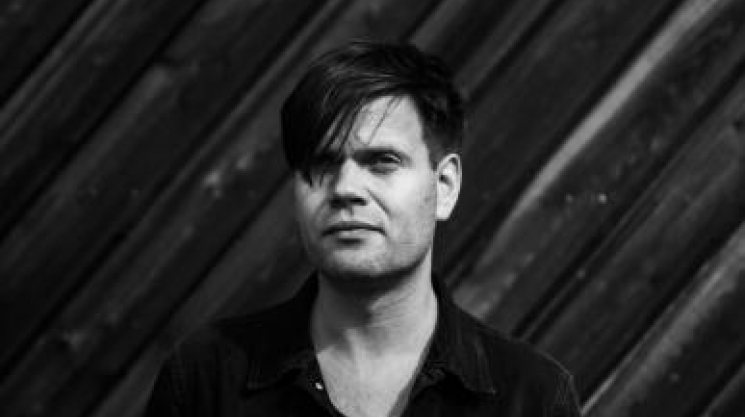
Mon, 12/09/2013 - 12:23 by Natasha Neale
If you’re looking for run-of-the-mill house music, Trentemøller won’t be your thing. This Dane seems as though, at times, he surprises even himself. Lacking the fear to branch out and try something new and unexpected, has ended with a traditional DJ heading out on an arena tour, full live band in tow. We can’t wait to see where else he might go, and neither can he. We asked Jemayel Khawaja to speak to Anders Trentemøller about his influences, creative process, and where he draws the line.
"We have this thing in Danish mentality called 'the gentle law',” explains Anders Trentemøller. “It is this idea that you shouldn’t think you are anything, that you are a zero and you should just shut up and put your nose down. If people are having success with something, there are always others feeling that they should back down and not be so cocky. It is very sad because it makes many people not do new stuff because they are afraid of what people will think.” That considered, it is even more remarkable that the multi-talented bedroom producer found himself so fearlessly performing full band renditions of his minimal dance compositions to packed stadiums this past summer.
It came as a surprise to many when Depeche Mode announced Trentemøller as the opening act for a leg of their European Tour, but there seemed a clear logic to the decision. The two acts share a certain melancholic aesthetic, and a soulfulness that flits between the organic and the electronic. “It was pretty crazy because I grew up listening to Depeche Mode,” says Anders. “They’ve really been a big part of my musical education. It was huge for us to be playing big stadiums in front of 70,000 people and before our old heroes. That was something special.”
Trentemøller’s sound perpetually roves between minimalist electronicism and a moody, baroque art-rock vibe. Every album, he revisits the challenge of translating his studio recordings into a live setting. He explains, “For me, playing with a band is kind of a big clash compared to when I am alone, sitting in my studio for months making my album, where I’m playing all the instruments myself and also producing. It is definitely a very quiet and lonely process. In the winter, there is not much to do outside because it is really freezing here in Denmark. It is great for me to write music.”
Though he generally composes by his lonesome, Anders lets band mates into the creative process when going live - “It’s really great when I finally have the album ready and I start rehearsing with my band, and the musicians come with ideas and feedback, trying to build, to transform the music from the studio to the live stage.” There is a marked difference between the restrained, housey dark-wave beats of many Trentemøller recordings, and the maximalist rock performance of the live band, replete with bespoke visuals and minor-chord riffage. It goes against convention, but that is a hallmark quality of Trentemøller’s creative output.
Anders doesn’t cut the figure of a guy you’d expect to be a fist-pumping lead to an arena rock band, but that’s the thing - Trentemøller and expectation don’t really jive that well together. “I never plan what kind of music I should do,” he explains, “it is always the music that takes me...I’ve found out that it is really bad for me to make plans.” The introverted Dane has found joy as producer, DJ, and as a performer. Don’t forget, his Essential Mix was voted number one by the UK’s BBC Radio 1 in 2006.
Trentemøller’s sound is defined more by an adherence to a dark and moody tone, rather than any genre classification. He holds an appreciation of all things brooding and cerebral. This is evident from his taste in media and collaborators. “One of my favorite movies is Mulholland Drive,” he says, and the cast of guests on Trentemøller’s upcoming release could provide a soundtrack to a David Lynch movie: Kazu Makino of Blonde Redhead, Sune Rose Wagner of The Raveonettes, and Minnesotan brood-core crooners Low all feature.
On collaborators: “I don’t start with anybody in mind. Every track that I write kind of dictates who to turn to. The funny thing is, I usually finish the track before I ask the vocalists to sing on it. Most of the time I’m just crossing my fingers. I was very lucky that everybody I wanted to work with said yes.” Anders shares vocal melody duties with collaborators, but “they are definitely doing the lyrics on their own,” he quips, “I’m really bad at doing lyrics and I think it is a much more honest expression if the vocalist is writing their own lyrics.”
Anders is tight lipped about the direction on the upcoming album, Lost, but says he’s still “mixing electronic sounds with the organic...using sounds that are very digital and then putting them through an old tape recorder or doing something to get an analog sound.” Anything is possible with Trentemøller, but one thing is for sure: “There will be no wobbling bass on the next album,” he laughs, “I hate dubstep. That will not come. Never ever.”
Trentemoller’s latest album, Lost, is out now through In My Room music.




Add comment